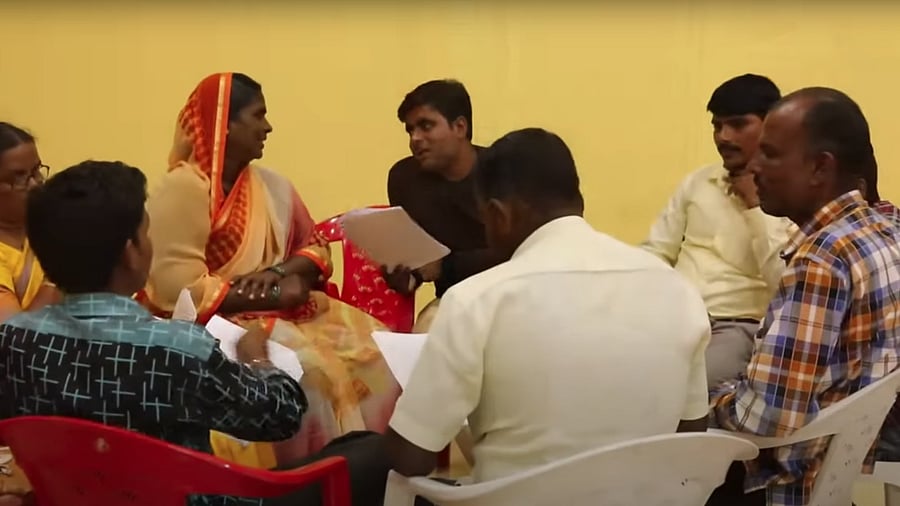
Group discussion before the Devadasi bill-drafting process.
Credit: YouTube
The right of a child to identify the father and the child's right to property are the two significant additions in The Karnataka Devadasi (Prevention, Prohibition, Relief and Rehabilitation) Bill drafted in 2018.
A copy of the Bill accessed by DH shows a holistic approach, with a focus on prevention, prohibition, relief and rehabilitation. The current Act focuses mostly on prohibition of the Devadasi practice found in 15 districts of the state.
Devadasi system is a religious practice whereby girls from deprived communities are dedicated to god. This regressive system forces women into a lifetime of sexual slavery.
Seven years after it was drafted, the Bill is likely to be tabled in the Assembly in the upcoming Budget session. The Women and Child Development Department has prepared the Cabinet note and sent it to 20 departments for their opinions. “From prevention to rehabilitation, every aspect has been taken care of in the Bill. Multiple departments have a role in the rehabilitation exercise. We are waiting for confirmation from them. Once that is obtained, we will place it before the Cabinet. The Bill is likely to be tabled in the coming Assembly session,” says Shamla Iqbal, Principal Secretary, Women and Child Development Department.
To put things in perspective, more than four decades after the Devadasi practice was prohibited in the state through the Karnataka Devadasis (Prohibition of Dedication) Act 1982, the regressive practice continues, albeit covertly.
At present, the practice does not require the male partner of a Devadasi to acknowledge the child as his own or take any paternal responsibilities. Addressing this as a key intervention to end the social prevalence of the practice, the draft Bill has proposed that any child born to a Devadasi will have the right to ascertain the identity of the father (Section 5). It also says that the child of a Devadasi shall be entitled to inherit and succeed to the property of both parents (Section 8).
The draft was prepared by the Talasamudayagala Adhyayana Kendra of National Law School of India University (NLSIU) with the participation of various stakeholders, particularly Devadasi women and their children.
“In fact, we could incorporate many aspects after Devadasi families pointed out the gaps in the statutory provisions,” says Chandrashekhar R V of NLSIU and the coordinator of the draft committee.
In addition to maintaining the deterrent penal provisions from the current Act, “the idea is to create a safety net for the survivors and their family through socio-economic protection mechanisms like access to education and livelihoods”, he says.
This will help the community come out of the grip of the evil practice permanently.
The Bill identifies multiple government departments, including health, education, skill development and social welfare as implementing agencies and collaborators for various Devadasi welfare programmes.
Kamakshi Nagenahalli, who helped the drafting committee as a research assistant, is from a Devadasi family. She says the experiences of the Devadasi families form the base of the current draft Bill. “The Bill acknowledges Devadasis and their children as rights-holders as opposed to beneficiaries, which is crucial to creating an agency for us,” she says.
“We don’t understand why there was such a delay. We hope the government passes the Bill in the upcoming session,” says M Bhagyalakshmi, director, Sakhi trust. She was a member of the drafting committee. Over the past two decades, Sakhi has developed a model for the overall empowerment of the Devadasi families in Vijayanagara district. “The government could consider emulating this model, which stresses on multi-pronged approach and generational support, across the state,” she adds.